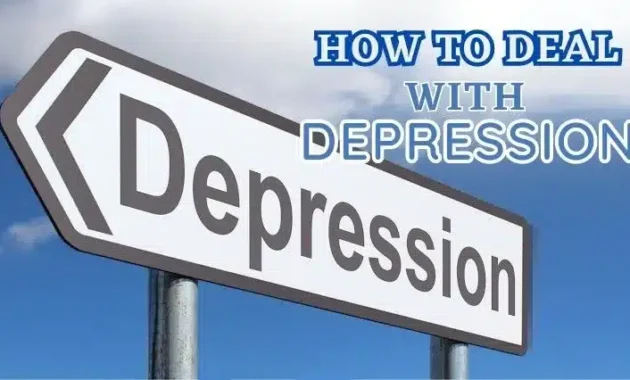Depression is a common but serious mood disorder that can affect people of all ages. It is characterized by persistent sadness, hopelessness, and a lack of interest in activities that were once enjoyable. Depression can also cause physical symptoms such as fatigue, changes in appetite and sleep patterns, and difficulty concentrating.
While it is expected to experience ups and downs in life, depression is different in that it can interfere with daily life and cause significant suffering. It is essential to seek help and treatment for depression, as it is a treatable condition. If untreated, depression can lead to serious health problems and suicidal thoughts.
This article will discuss various tips and strategies for managing depression and improving mental health. By implementing these strategies, individuals can take an active role in their recovery and find relief from the symptoms of depression. We will cover topics such as seeking professional help, practicing self-care, connecting with others, and making lifestyle changes to improve mental health.
Identify the cause of your depression.
Identifying the cause of your depression is an essential step in finding the most effective treatment and management strategies. While the exact cause of depression is not fully understood, it is thought to be a combination of genetic, environmental, and psychological factors.
Talking to a mental health professional, such as a therapist or counselor, can help you to understand the root cause of your depression. They will ask about your personal and family history, as well as any life circumstances that may be contributing to your depression. This information can help them to determine the most appropriate course of treatment for your specific needs.
It is also essential to consider any personal and family history of mental health disorders, as this can increase the risk of developing depression. Life circumstances, such as a recent loss or significant life change, can also contribute to the onset of depression. By understanding the cause of your depression, you can take steps to address the underlying issues and find relief from the symptoms.
Seek professional help
Seeking help from a mental health professional is essential in managing depression and finding relief from the symptoms. A therapist or counselor can provide support, guidance, and tools to help you cope with your feelings and improve your overall mental health.
There is a range of options for the treatment of depression. The most appropriate choice will depend on the severity of your symptoms and the underlying cause of your depression. Common treatments for depression include medication and talk therapy, also known as psychotherapy.
Medication, such as antidepressants, can help to balance the chemicals in the brain that regulate mood and improve symptoms of depression. However, it is essential to work closely with a mental health professional to determine the most suitable medication and dosage, as everyone is different.
Talk therapy, or psychotherapy, involves talking with a trained mental health professional about your thoughts, feelings, and behaviors. It can be an effective treatment for depression, as it can help you to identify and change negative thought patterns and behaviors that contribute to your depression. Talk therapy can be conducted individually, in a group setting, in person, or online.
It is important to remember that seeking help is a sign of strength, not weakness. By seeking professional help, you can take an essential step towards managing your depression and improving your overall mental health.
Practice self-care
Practicing self-care is essential to managing depression and maintaining overall mental health. It involves taking care of your physical and emotional health and can help to reduce symptoms of depression and improve overall well-being.
There are many ways to practice self-care, and finding activities that work for you is essential. Some common self-care strategies include:
- Exercising regularly: Physical activity can help to improve mood and reduce symptoms of depression. Aim for at least 30 minutes of moderate-intensity exercise, such as brisk walking or cycling, on most days of the week.
- Getting enough sleep: Adequate sleep is essential for good physical and mental health. Establish a consistent sleep routine, and aim for 7-9 hours of sleep per night.
- Eating a healthy diet: A balanced diet that includes a variety of fruits, vegetables, and whole grains can help to improve mood and reduce symptoms of depression. Avoiding alcohol and caffeine, and staying hydrated, can also support good mental health.
In addition to these strategies, finding activities that bring you joy and relaxation is essential. It could include hobbies, spending time in nature, or simply taking time for yourself. By prioritizing self-care, you can improve your mental health and find relief from the symptoms of depression.
Connect with others
Connecting with others is essential to managing depression and improving overall mental health. Social support and connection can provide a sense of belonging, improve mood, and reduce feelings of isolation and loneliness.
There are many ways to connect with others and find social support. Some options include:
- Joining a support group: Support groups provide a safe and supportive environment for individuals to share their experiences and feelings with others who are going through similar challenges. They can be helpful resources for finding support and understanding.
- Volunteering: Volunteering can be a rewarding way to connect with others and give back to the community. It can also provide a sense of purpose and improve self-esteem.
- Reaching out to friends and family: Building and maintaining strong relationships with loved ones can provide a sense of connection and support. Please make an effort to spend quality time with friends and family, and don’t be afraid to ask for help when you need it.
- Online communities: If you cannot connect with others in person, many online communities and forums provide a space for individuals to connect and share their experiences with others.
Remember, it is essential to surround yourself with supportive and understanding people. By connecting with others and building a solid social network, you can improve your mental health and find relief from the symptoms of depression.
Find healthy ways to cope with stress.
Stress is a normal part of life, but when it becomes chronic, it can worsen symptoms of depression and hurt overall mental health. It is essential to find healthy ways to cope with stress to manage depression and improve overall well-being.
Here are some strategies for managing stress:
- Practice relaxation techniques: Techniques such as deep breathing, progressive muscle relaxation, and meditation can help to reduce stress and improve mood.
- Set boundaries: It is essential to set limits and limitations to protect your time and energy. Saying no to commitments that are not a priority can help to reduce stress and improve overall well-being.
- Get organized: A cluttered environment can contribute to stress. Taking the time to get collected and create a sense of order can help to reduce stress and improve overall well-being.
- Seek social support: Connecting with others and sharing your feelings can provide a sense of connection and license, which can help to reduce stress.
By finding healthy ways to cope with stress, you can improve your mental health and find relief from the symptoms of depression. It is also important to remember that taking breaks and prioritizing self-care when needed is okay.
Make lifestyle changes
Making lifestyle changes can be an effective way to manage depression and improve overall mental health. Certain lifestyle factors, such as diet, exercise, and sleep, can significantly impact mood and well-being.
Here are some tips for making positive changes to your lifestyle:
- Eat a healthy diet: A diet rich in fruits, vegetables, and whole grains can help improve mood and reduce symptoms of depression. Avoiding processed and sugary foods can also support good mental health.
- Exercise regularly: Regular physical activity has been shown to improve mood and reduce symptoms of depression. Aim for at least 30 minutes of moderate-intensity exercise, such as brisk walking or cycling, on most days of the week.
- Get enough sleep: Adequate sleep is essential for good physical and mental health. Establish a consistent sleep routine, and aim for 7-9 hours of sleep per night.
- Find activities that bring joy: Engaging in activities that bring fun and relaxation can improve mood and reduce stress. It could include hobbies, spending time in nature, or simply taking time for yourself.
By making positive changes to your lifestyle, you can improve your mental health and find relief from the symptoms of depression. It is also important to remember that making lifestyle changes can take time, and it is okay to progress at your own pace.
Conclusion
Managing depression can be challenging, but it is possible with the proper support and care. By implementing the tips and strategies discussed in this blog post, you can take an active role in your recovery and find relief from the symptoms of depression.
It is important to remember that seeking help is a sign of strength, not weakness. By seeking help from a mental health professional, such as a therapist or counselor, you can gain the tools and support you need to manage your depression and improve your overall mental health. Treatment options, such as medication and talk therapy, can be effective in reducing symptoms of depression and improving overall well-being.
In addition to seeking professional help, self-care, connecting with others, and making lifestyle changes can all be effective strategies for managing depression. By prioritizing your physical and emotional health, you can improve your mental health and find support on your journey toward recovery.
Overall, it is essential to remember that recovery from depression is possible with the proper support and care. By implementing these strategies and seeking help when needed, you can find relief from the symptoms of depression and improve your overall well-being.


